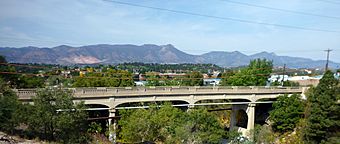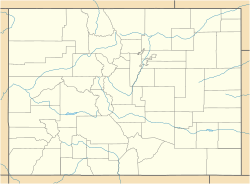Cottonwood Creek Bridge (Colorado Springs, Colorado) facts for kids
|
Cottonwood Creek Bridge
|
|
 |
|
| Location | Vincent Street over Cottonwood Creek, Colorado Springs, Colorado |
|---|---|
| NRHP reference No. | 01001104 |
Quick facts for kids Significant dates |
|
| Added to NRHP | October 12, 2001 |
The Cottonwood Creek Bridge is a special bridge located in Colorado Springs, Colorado. It crosses over Cottonwood Creek. This bridge is important because it is listed on the National Register of Historic Places. This means it is recognized as a significant historical structure in the United States.
Contents
What Makes This Bridge Special?
The Cottonwood Creek Bridge was finished in 1923. At that time, it was built on a very important road. This road connected different parts of Colorado, running from north to south.
A Unique Design for Its Time
The bridge is quite unique for its age. It is one of the few long bridges of its kind from the 1920s in Colorado. It uses a design called "cantilevered, girder."
- A girder bridge uses strong beams (girders) to support the road above.
- A cantilevered design means parts of the bridge stick out like arms, supported only at one end.
The Cottonwood Creek Bridge has a road surface made of concrete. It is made up of four sections, called "spans." Each of these spans is about 53 feet long.
Cool Concrete Details
The bridge also has some interesting artistic touches. It features a "hammered concrete treatment" on its "spandrels." Spandrels are the spaces between the arches or supports of a bridge. This "hammered" look gives the concrete a textured, unique finish.
The bridge's guardrails are also special. They are made from "cast concrete balusters." Balusters are small, shaped pillars that support a railing. These details make the bridge not just strong, but also very attractive.
Why Is It a Historic Place?
The Cottonwood Creek Bridge was added to the National Register of Historic Places on October 12, 2001. It earned this honor because it is a great example of bridge building from the 1920s. Its unique design and construction methods make it an important part of Colorado's history. It shows how bridges were built almost 100 years ago.
 | Percy Lavon Julian |
 | Katherine Johnson |
 | George Washington Carver |
 | Annie Easley |



